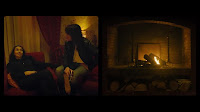Benjamin Christensen's Häxan is probably the first horror documentary. Its images are so eerie, it has been excerpted and edited into dozens of subsequent films. (Being in the public domain also makes it attractive.) Once again, it sets the mood for a film about witches, but the lunacy that follows the opening snippets is all Gaspar Noe. First, they talk, then they go crazy in Noe’s Lux Æterna, which opens Friday at the Metrograph.
Throughout the film, Noe uses a split-screen, very much like the so-called “Duo-Vision” of Richard L. Bare’s notorious Wicked, Wicked. Of course, Noe’s film is also all very meta, with the cast playing loosely fictionalized (and improvised) versions of themselves. It opens with director Beatrice [Dalle] talking to her star, Charlotte [Gainsbourg], while the rest of the crew prepare (haphazardly and chaotically) for a big stake-burning scene.
Clearly, Beatrice and Charlotte respect each other, because of their common experiences in the industry. However, the crusty old cinematographer and sleazy producers are openly contemptuous of the inexperienced director (most of whose work has been in front of the camera). It all comes to a head when the shoot nose-dives into Hell, but when that happens on a Noe production, it is simply called a Tuesday.
The film opens with an epileptic strobe warning, with good reason. It is short, but strange—and relentlessly flashing. Lux Æterna is not even an hour long, but it would be hard to watch much more without your eyeballs exploding. A lot of the split-screen use is just as gimmicky as Bare’s 1973 cult favorite, but the visual explosion of the climax is vintage Noe.
Arguably, this is very much a horror film—a pretty shocking one in fact. It just really takes its time on the build-up. After all, there is a long tradition of artsier horror films, gravitating towards witches and witchcraft, including the Visconti/Pasolini/De Sica anthology The Witches and good old Häxan. Like many of those films, there is also a pronounced feminist angle here, particularly when it comes to the film production process. Ironically, Noe might up indicting himself, in retrospect—given what he puts his cast through.
Regardless, Dalle is mordantly funny, while Gainsbourg is surprisingly emotionally engaging as her meta-self. Noe really gives the latter some disturbing material to work with, which is inevitably personalized by the nature of the film. She survived some of Lars von Trier’s more extreme films, so she presumably survived a shorty from Noe just fine, as well.
Maybe Noe should try to worker shorter, because part of reason Lux Æterna pops so powerfully is its tight compactness. Still, it really should be seen on a big screen, if possible. Highly recommended for fans of witch movies, Noe, and Gainsbourg, Lux Æterna opens this Friday (5/6) in New York, at the Metrograph.

